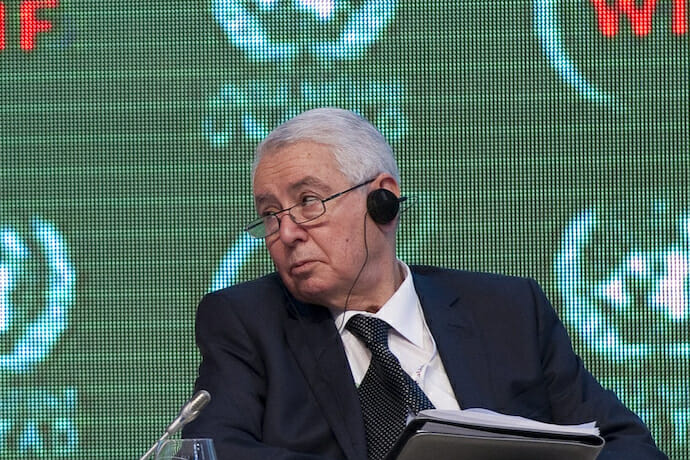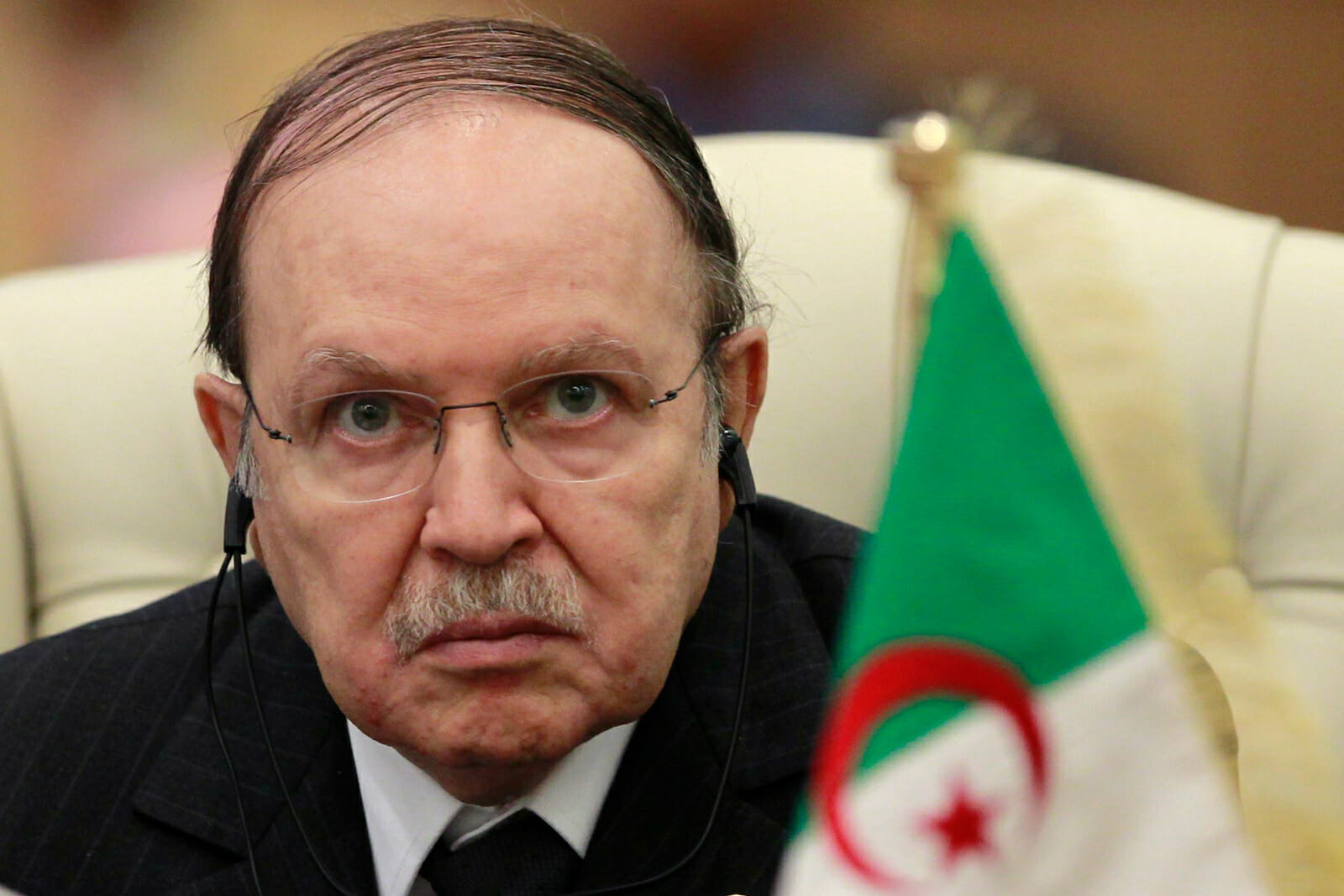Intpolicydigest
Emily Flaherty
Heralded as a new Arab Spring, the recent protest movements in Algeria and Sudan, have achieved significant moments of victory in the resignations of Presidents Abdelaziz Bouteflika and Omar al-Bashir respectively, earlier this month.
But the long-term goals of these movements have yet to be attained, and their long term impacts, yet to be felt. In Algeria at least, a significant struggle lies ahead for the protestors if they are to reach their goal of changing the system.
Since February hundreds of thousands of protestors have been taking to the streets of cities and towns around Algeria. Initially, this was to protest Bouteflika’s decision to put himself forward for a fifth term in office. Following the latter’s resignation, the movement now calls for a complete reform of the system, in part through a removal of the old guard as represented by interim President Abdelkader Bensalah, Prime Minister Noureddine Bedoui and Constitutional Council Chairman Tayeb Balaiz (since resigned) – the so-called “3Bs” – and other key members of government before the upcoming elections on 4 July. Local press reports that demonstrations have not diminished in size or scale, with protest events having taken place in 41 out of the 48 wilayas. The protests have been characterised as peaceful methods on the part of the protestors, bringing together people from all parts of society, young and old, workers and students, all coming together to call for change.
Algerians are angry – and not without cause. Unemployment rates remain persistently high, especially among youths (in 2018 unemployment rates for this group stood at over 28%). Compared with similar emerging economies corruption in Algeria is particularly high, while its infrastructure ranks considerably low, as does the quality of its public services especially in education and healthcare. Additionally, there remain significant human rights issues in Algeria. Free speech, freedom of assembly and peaceful protest remain severely limited through harsh laws and stringent implementation. Religious minorities, such as the Almadiyya, suffer widespread persecution and routine discrimination on the part of state authorities, while certain divorce laws still discriminate against women. The state continues to resist attempts to register human rights NGOs in Algeria and resists official UN human rights visits and mechanisms.
Such is the crucible from which the current revolt against the system has emerged and such is the authoritarian state against which it stands. In order to fully appreciate the extent of the challenges facing this movement we need to understand the role the army has played and continues to play in the history of the Algerian state.

Algeria’s interim President Abdelkader Bensalah. (UNCTAD)
The army has frequently intervened in Algerian politics since independence in 1962, most notably in 1992 when it canceled the general elections in which the opposition had been poised to win thus triggering what became the civil war. Leading historians and experts in the field, such as Martin Evans and John Phillips assert that the army also rigged the 1999 and 2002 elections. More recently, it is highly significant that Bouteflika only announced his resignation after the Army Chief of Staff General Ahmed Gaid Salah came out against him.
The army’s power both derives from and perpetuates its symbolic role in the history of the state, specifically its role during the War of Independence. Since independence, the FLN has crafted a narrative to justify its rule, one that paints the War of Independence as the foundation stone of the Algerian state and nation, and portrays the struggle for independence as a glorious heroic revolution of one people rising together against French imperial forces.
In this version of history, it is important to note that not only are other groups and actors written out completely, but the masses supported and were embodied by the FLN, thus allowing the FLN to justify their rule and their regime as the unchallenged embodiment of the Algerian people. Within this narrative the army plays a central role thereby, as historian Raphaëlle Branche argues, allowing it to traditionally hold a more important place in Algerian society than civilians. Even if younger generations no longer subscribe to official state narratives of the history of independence, this legacy informs the role of the army within the Algerian state.
And this role has often been a violent one. It is believed that the army was heavily implicated in civil war atrocities. Due to an official amnesty no one has been held accountable for the war crimes of this period. Prior to this, other protest movements, such as the Berber Spring movement and the Black October protests saw severe and violent repression by state security forces. The latter resulted in reportedly 500 dead and 1,000 injured. Leading historian Martin Evans identifies a trend of political repression and Algerian state violence against Algerian people that predates Algerian Independence; during the War of Independence the FLN, and its military wing, the ALN, the antecedents of the present national army, targeted and massacred rival independence groups, and was party to the post-independence reprisals against harkis – Algerian auxiliaries in the French army – which saw up to 150,000 massacred. In other words, throughout the history of the state, and during its formation, the army has been deeply connected with a pattern of implicit or explicit state-sanctioned violence against the people of Algeria.
In the current crisis, the army remains a major force with which to be reckoned. Following Bouteflika’s resignation, Gen. Gaid Saleh warned that foreign actors, seeking to destabilise and divide the nation with slogans and rallying cries that were unobtainable, were causing the protests. The general continues to intervene publicly, to reaffirm the role of the army in the transition period and to warn against disrupting state institutions. Since Bouteflika’s resignation, security forces have begun using tear gas and water cannons against protestors (hitherto the protests were met by largely non-violent responses); earlier this week the government insisted that no such repressive responses had been officially sanctioned. It is becoming clear that while the army might have supported the ousting of Bouteflika as a necessary sacrifice to the protestors. It does not support the system overhaul that is being called for on the streets. The protests continue.
Could the situation escalate? This remains a definite possibility. Challenging ‘the system’ or ‘le pouvoir’ (the power) means challenging the army. Arguably the real test of the success of this movement is how well it negotiates this challenge. For real, lasting change in Algeria, the military needs to be removed from state politics. Achieving this would constitute a tipping point in Algerian history. However, this moment is as yet not even on the horizon. Whatever happens remains to be seen, but what is clear is that for the protestors on the streets the struggle lies ahead.








